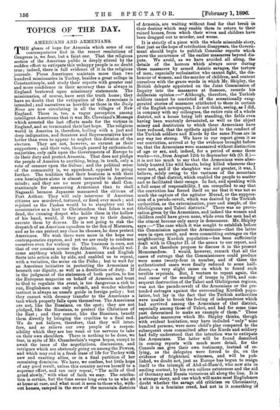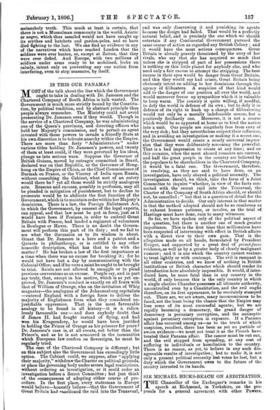TOPICS OF THE DAY.
AMERICANS AND ARMENIANS. THE gleam of hope for Armenia which some of our contemporaries find in the recent resolutions of Congress is, we fear, but a faint one. That the religious section of the American public is deeply stirred by the sudden effort to extirpate this unhappy people is no doubt true; indeed, there is full evidence of it in the religious journals. Pious Americans maintain more than two hundred missionaries in Turkey, besides a great college in Constantinople, and study their reports with greater zeal and more confidence in their accuracy than is always in England bestowed upon missionary statements. The missionaries, of course, have sent the truth home; they have no doubt that the extirpation of the Armenians is intended; and narratives as horrible as those in the Daily News are now circulating in all the villages of New England. There is, too, a vague perception among intelligent Americans that it was Mr. Cleveland's Message which arrested the last efforts made for the victims in England, and so terminated their last hope. The religious world in America is, therefore, boiling with a just and deep indignation, and Senators and Representatives know better than even to appear to neglect this division of the electors. They are not, however, so earnest as their supporters ; and their vote, though passed by enthusiastic majorities, only calls upon the Governments of Europe to do their duty and protect Armenia. That does not pledge the people of America to anything, being, in truth, only a vote of censure upon the Sultan ; and the political sense of the community is, we apprehend, opposed to going further. The tradition that their business is with their own hemisphere alone is almost immovable in American minds ; and they are no more prepared to shell Con- stantinople for massacring Armenians than to shell Nagasaki because Japanese massacred the citizens of Port Arthur. They will only intervene if American citizens are murdered, tortured, or fined over much ; and rejoiced as the Pashas would be to slaughter out the missionaries as a hint to Christendom that Islam is not dead, the cunning despot who holds them in the hollow of his hand, would, if they gave way to their desire, execute them by dozens. He is not going to risk the despatch of an American squadron to the Sea of Marnaora, and as he can protect any class he chooses, he does protect Americans. We wish there were more in the hope our contemporaries express, and yet we are ready to condemn ourselves even for wishing it. The business is ours, not that of our cousins across the Atlantic. We should wel- come anything which brought American and English fleets into action side by side, and enabled us to repeat, with a variation, the scene on the Peiho ; but to wait for an American initiative in protecting the Armenians is beneath our dignity, as well as a dereliction of duty. If in the judgment of the statesmen of both parties, to fire the European magazine on behalf of Armenia and trust to God to regulate the event, is too dangerous a risk to run, Englishmen can only submit, and wonder whether instinct is always an unsafe guide in foreign policy ; but they cannot with decency transfer to the Americans a task which properly falls upon themselves. The Americans are not, like the Russians, on the spot; they are not pledged, like the Russians, to protect the Christians of the East ; and they cannot, like the Russians, benefit them directly by bringing the cruelties to a final end. We do not believe, therefore, that they will inter- fere, and so relieve our own people of a respon- sibility which they are too weak or too nervous to take on their own shoulders. There is nothing to be done, we fear, in spite of Mr. Chamberlain's vague hopes, except to await the issue of the negotiations, discussions, and intrigues which are obviously going on among the Powers, and which may end in a fresh lease of life for Turkey with new and exacting allies, or in a final partition of her remaining dominion. We have, we confess, but little hope of any good result, unless this country nerves herself to a supreme effort, and can only repeat, "The mills of God grind slowly," with what of faith we may. The retribu- tion is certain, but the time seems long even to us who sit at home at ease, and what must it seem to those who, with- out houses, camped in the snow of the mountain districts of Armenia, are waiting without food for that break inx their destiny which may enable them to return to their ruined homes, from which their wives and children have been dragged out to murder, and worse.
It is strictly of a piece with the whole miserable story, that just as the hope of retribution disappears, the Govern- ment should begin to publish Consular reports which prove the occurrence of the earlier massacres beyond dis- pute. We avoid, as we have avoided all along, the details of the horrors which always occur during' these massacres by armed Asiatic savages, the torture of men, especially ecclesiastics who cannot fight, the dis- honour of women, and the murder of children, and content ourselves with the grave words in which Mr. Shipley, the British delegate appointed on the Joint Commission of Inquiry into the massacres at Sassoon, records his deliberate opinion :—" Although, therefore, the Turkish soldiers cannot be convicted of the sensationally exag- gerated stories of massacre attributed to Ithem in certain of the English newspapers, I do not think, seeing, as I did, in company with my colleagues, the entire ruin of a whole district, not a house being left standing, the fields even having been wantonly devastated, as well as the abject misery and destitution to which these Armenians have been reduced, that the epithets applied to the conduct of the Turkish soldiers and. Kurds by the same Press are in, any way too strong. We have in our report given it as our conviction, arrived at by the evidence brought before us, that the Armenians were massacred without distinction of age or sex, and, indeed, for a period of some three weeks—viz., from August 12th to September 4th (0. S.)— it is not too much to say that the Armenians were abso- lutely hunted like wild beasts, being killed wherever they were met, and if the slaughter was not greater, it was, I believe, solely owing to the vastness of the mountain ranges of that district, which enabled the people to scatter' and so facilitated their escape. In fact, and speaking with a full sense of responsibility, I am compelled to say that the conviction has forced itself on me that it was not so much the capture of the agitator Murad, or the suppres- sion of a pseudo-revolt, which was desired by the Turkish authorities, as the extermination, pure and simple, of the Gh6lieguzan and Talon i districts." There was no provo- cation given by the Armenians, and indeed the women and children could have given none, while even the men had at the utmost become only saucy in demeanour. Mr. Shipley says :—" The case which it was sought to establish before the Commission against the Armenians—that the latter were in open revolt, and were committing outrages on the neighbouring Kurdish population—has been sufficiently dealt with in Chapter II. of the annex to our report, and I do not therefore propose to discuss it in the present Memorandum. I would, however, remark that all the cases of outrage that the Commissioners could produce were some twenty-four in number, and of these the authenticated cases were finally reduced to some half- dozen,—a very slight cause on which to found such terrible reprisals. But, I venture to repeat again, the real cause of the sending of troops in 1894, and con- sequent destruction of the Talon i and Ghelieguzan regions, was not the pseudo-revolt of the Armenians or the pre- tended outrages against the surrounding Kurdish popu- lation, but lay in the fact that the Turkish authorities were unable to brook the feeling of independence which had survived among the Armenians of that district, especially among those of Talon, and had for some time past determined to make an example of them." These particular massacres which Mr. Shipley thinks, though with evident hesitation, may have included " only " nine hundred persons, were mere child's play compared to the subsequent ones committed after the Kurds and soldiery had fully understood that the intention was to extirpate the Armenians. The latter will be found described in coming reports with much more detail, for the Consuls can give their own testimony, instead of re- lying, as the delegates were forced to do, on the evidence of frightened witnesses, and will be pub- lished, we doubt not, just as Europe has begun to resign itself to the triumph of .A.bd-ul-Hanald, who now sits in smiling content, by his own callous astuteness and the aid of Germany and Russia victorious all along the line. It is a strange story, and one which will make most Englishmen doubt whether the savage old criticism on Christianity, that it is a feminine creed, had not in it something of melancholy truth. This much at least is certain, that there is not a Mussulman community in the world, Asiatic or negro, which thus assailed would not have caught up its scythes and hatchets and garden-poles, and so have died fighting to the last. We can find no evidence in any of the narratives which have reached London that the soldiers were ever beaten, or, except at Zeitun, that they were ever defied. And Europe, with two millions of soldiers under arms ready to be mobilised, looks on calmly, intent only on preventing any one nation from interfering, even to stop massacre, by itself.







































 Previous page
Previous page